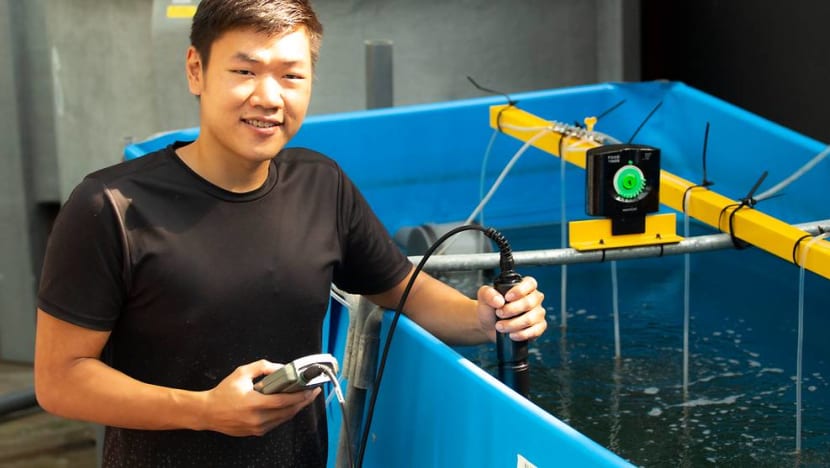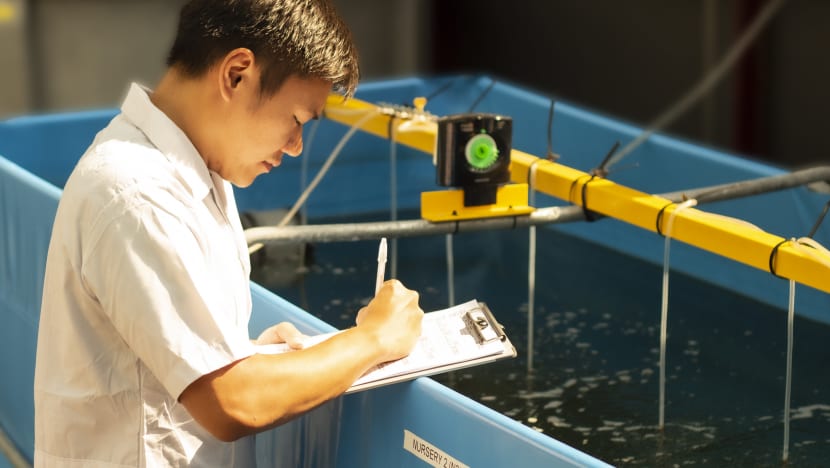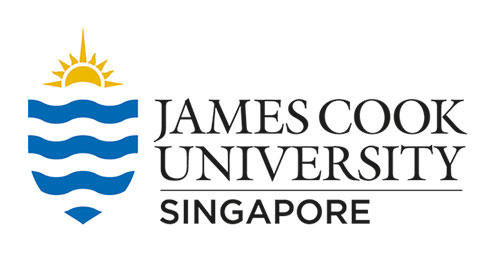Learning the business – and joy – of farming fish
With a Bachelor of Business and Environmental Science (Majoring in Aquaculture) from the Singapore campus of James Cook University, Mr Jordan Chia is ready to dive into the fast-growing and future-oriented sector of aquaculture.

Mr Jordan Chia’s time at JCU provided him with sound theoretical knowledge and extensive hands-on experience. Photos: James Cook University/Lim Swee Ming
As a small island nation, Singapore has always been dependent on importing food from other countries. However, the Government’s 30 by 30 strategy – which aims to increase local food production to fulfil 30 per cent of Singapore’s food needs by 2030 – has resulted in a boost to Singaporean farming, powered by exciting ventures in research and technology aimed at growing food efficiently in our mostly urban environment.
With support from the Government, companies in innovative new sectors like aquaculture are expanding rapidly in Singapore. According to 28-year-old aquaculture manager Jordan Chia, there is demand for people who are able to “share their insights and knowledge obtained from studies in this industry, as current trends involve the use of high-tech equipment and new techniques”.
Mr Chia himself decided to pursue his interest in marine life after graduating with a diploma in Health Science from Nanyang Polytechnic. In 2018, he enrolled in the Singapore campus of James Cook University (JCU), the only institute of higher learning in Singapore to offer an aquaculture-related degree. He graduated in 2020 with a Bachelor of Business and Environmental Science (Majoring in Aquaculture).
EXPLORING AQUACULTURE, HANDS-ON
Mr Chia’s time at JCU gave him a solid foundation of theoretical knowledge topped off by extensive hands-on experience in the JCU aquaculture laboratory, where he was a pioneer volunteer.
“The education I received at JCU was outstanding,” said Mr Chia. “The aquaculture lecturers were knowledgeable and supportive.”
His favourite module was Introduction to Aquaculture, which taught him the foundations and basics of the vast aquaculture industry. While at JCU, he had the opportunity to go on a six-month internship with the Singapore Food Agency at the Marine Aquaculture Centre, as well as numerous field trips to local farms to learn more about different types of indoor and outdoor farming systems.
Mr Chia feels that these first-hand industry encounters gave him a better grasp of the inner workings and complexity of operating farms, as compared to merely learning about them in theory.
“I am now very familiar with the different types of farm systems and can understand how a system works almost immediately,” he said. “Understanding how different systems work is very important, as they are like the base platforms of operations.”
During his time as a volunteer at the JCU aquaculture laboratory, Mr Chia performed experimental trials on both fresh and sea water species, which helped him to understand the requirements of maintaining cultured species in indoor tanks. This meant that he was able to adapt quickly once he entered the workforce as he already knew what to expect in his chosen line of work.
GROWING LIVESTOCK, AND AN INDUSTRY

As an aquaculture manager at Vertical Oceans, Mr Chia’s duties include monitoring the health of cultured species, as well as harvest and processing. He credits getting his job to his industry experience, with help from his JCU degree.
While the work is sometimes tiring and difficult, he views obstacles as challenges to improve himself. Said Mr John F Diener, co-founder and chief executive officer of Vertical Oceans: “Whether at 2am or 2pm, Jordan is always enthusiastic and positive with a strong work ethic and spirit. He dives right in – literally – and does what needs to be done.”
Mr Chia feels most rewarded when he sees his livestock grow to their final desired stage – for example, from the larvae phase to full adults – especially if they are able to do even better in a controlled environment than they would in the wild.
“The most important thing that keeps me going every day is the job satisfaction. Being able to see the end product that started from scratch always brings me fulfilment,” he said. “It ultimately contributes to the sustainability goal as the full cycle of the cultured species is completely cultured in a controlled environment. It shows that we can cultivate our own nutritional requirements without impacting the wild population. Also, the constant need and want to improve myself keeps me going, as I feel that I’m still learning constantly and still gaining experience as time goes on.”
Watch a course preview of James Cook University’s Bachelor of Business and Environmental Science (Majoring in Aquaculture).















